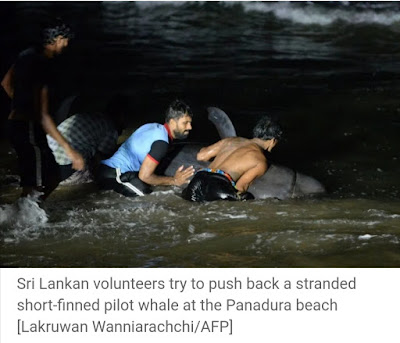Sri Lankan Rescuers Save 100 Whales After Mass Beaching Near Colombo
In a heartwarming rescue effort, Sri Lankan officials successfully returned 100 stranded short-finned pilot whales to the sea after a mass beaching incident on Monday, the country's navy confirmed. The event occurred in Panadura, located 25 kilometers (15 miles) south of Colombo, where dozens of whales began coming ashore in the afternoon. Authorities quickly mobilized to save the marine mammals, marking the largest single pod of whales to ever strand in Sri Lanka.
Local residents, along with officials from the Sri Lanka Navy, Coast Guard, and Marine Environment Protection Authority (MEPA), worked together in a tireless operation to push the whales back into the water. The rescue team also received support from a local water sports club, whose jet skis helped transport the whales back into the ocean.
Dharshani Lahandapura, the head of MEPA, stated that such a large stranding was highly unusual and remains unexplained. "It is very rare for this many whales to wash up on our shores," Lahandapura told AFP. While authorities have yet to determine the cause of the beaching, they are investigating the death of four whales during the rescue attempt. Initial reports suggest the whales may have followed one off-course member, leading to the mass stranding.
The remarkable rescue effort involved a coordinated response that lasted through the night, with assistance from lifeguards and community volunteers. Sri Lanka’s navy issued a statement noting that jet skis, provided by the water sports club, played a crucial role in returning the whales to the ocean during the challenging operation.
This beaching incident brings to mind a similar event in Tasmania, Australia, where nearly 500 whales beached in September, marking the largest stranding in the state’s history. Despite efforts to save them, at least one-third of the whales died during rescue attempts.
Mass strandings of whales are still not fully understood by marine scientists. These highly social animals travel in pods, and factors such as navigational errors, changes in ocean currents, or environmental factors may contribute to such incidents.
As Sri Lanka continues to investigate the causes of this rare stranding, the rescue efforts highlight the collaborative spirit and determination to protect these majestic creatures. While the cause remains unclear, experts continue to study the phenomena, with hopes of uncovering the mysteries behind these mass strandings.


0 Comments